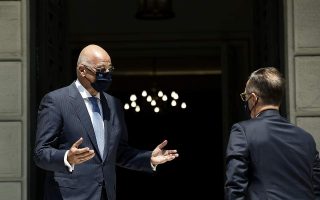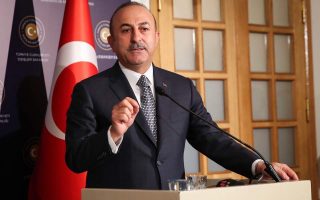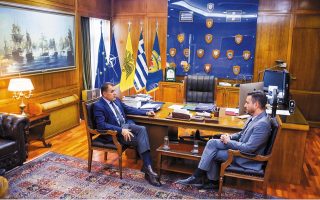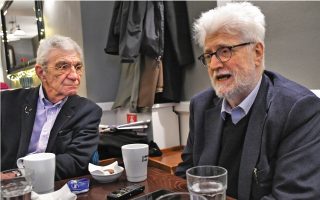Turkey becoming ‘more of a challenge to US,’ Biden Center director tells Kathimerini
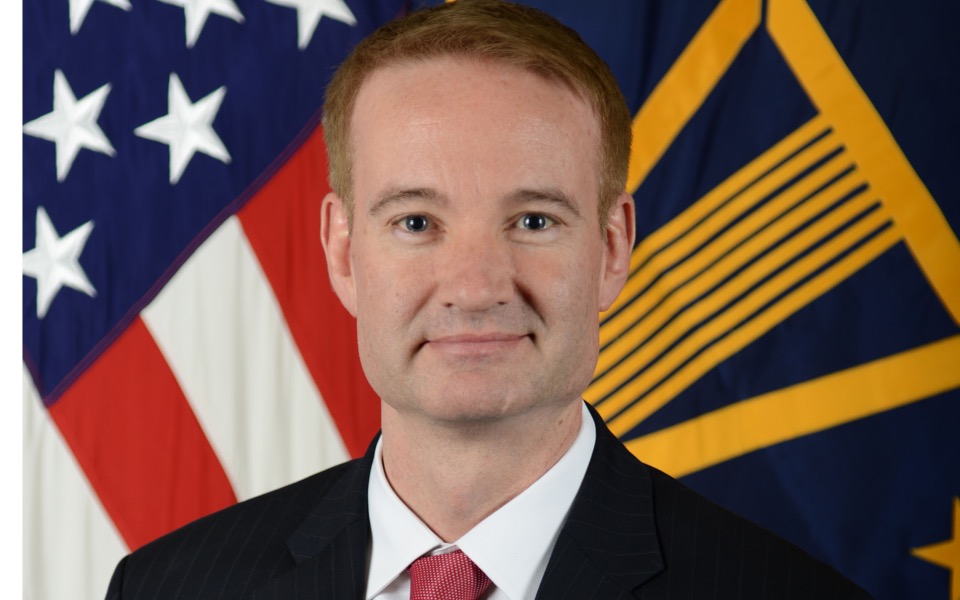
The senior director of the Penn Biden Center for Diplomacy and Global Engagement Michael Carpenter tells Kathimerini in an interview that US-Greece ties are one of the “very few bright spots” in transatlantic relations at the moment.
Carpenter, who served as foreign policy adviser to Vice President Joe Biden, says that President Donald Trump’s undermining of America’s closest alliances is a tragedy, while also offering his views on relations with Turkey, the latter’s demarcation agreement with Libya, Cyprus’ role and regional cooperation in the Eastern Mediterranean.
In an article in Foreign Affairs, former vice president Biden criticized President Trump for undermining diplomacy and America’s strategic partnerships. Do you share his view?
I very much share that view. I think it’s a real tragedy that over the last three years President Trump has undermined our closest alliances with our democratic partners and friends around the world, including in Europe, the members of the NATO alliance, but also in East Asia. That really sends us back when it comes to confronting the challenges of the 21st century, whether it’s big powers like Russia and China, or whether it’s other types of challenges like pandemic disease. The threats of the future are not ones that can be tackled by nation states alone, and to see especially the transatlantic relationship so frail is really frightening to me.
Still, US-Greece relations have been described as the best they have ever been. Do you agree with this premise, and, if so, why do you think that might be the case?
I do agree with it. I think that Greece is one of the very few bright spots in our transatlantic relationship and that is due to a set of unique factors. One of them is the fact that Prime Minister Kyriakos Mitsotakis has such strong ties to the US, and not just to the Trump administration, but I think bipartisan ties that extend to a range of members of Congress on both sides of the aisle. We have a fantastic ambassador in Athens in Geoff Pyatt. And the strategic situation in Southeast Europe and especially in the Eastern Med is such that as Turkey becomes less and less of a reliable NATO ally and more of a challenge to US security interests in the region, it is natural that we rely more and more on Greece. But also because Greece shares our values and is a democracy committed to a Europe whole, free and at peace, whereas Turkey is playing a very dangerous role in Cyprus, in Syria, in Libya, and in other parts of the region.
Does Turkey’s acquisition of the S-400 missile system from Russia pose a strategic threat for NATO?
Well, no. I don’t think the S-400 acquisition poses a strategic threat. I think it is a tactical threat. It makes it impossible for the US to cooperate with Turkey on the development of the F-35 fighter, because the S-400 system is designed through its algorithm to collect intelligence on the flight performance of the F-35. So, it’s really impossible to have both. And Turkey has shown very clearly that it wants to have the S-400, so that means that it can’t have the F-35. But that’s not a strategic issue, it’s more of a tactical, technological issue. If there were a strategic rapprochement between Turkey and the rest of NATO, I am sure there would be a way to find a solution to the S-400 problem, where that system could essentially be sidelined.
But I think the greater problem is that [Turkish President Recep Tayyip] Erdogan is both increasingly authoritarian at home and is causing trouble for the European Union and for the NATO alliance in his neighborhood. By that I’m thinking of his denial of Cyprus’ rights to develop hydrocarbon resources in its exclusive economic zone (EEZ), I’m thinking of his intervention in Libya, the conflict with the YPG [Kurdish militia] in Syria which has displaced the US, all be it with President Trump’s support – but all these things are causing Turkey to get crosswise with our European allies. At the same time, there are potentially common interests, as neither Turkey nor Europe wants to see millions of refugees flow from Idlib into Turkey. So, there are still common interests where we should be cooperating, but it’s just much more painful these days compared to five, six, seven year ago.
You mentioned some aspects of Turkey’s foreign policy that are seen by its neighbors as power projection. Does this mean anything for the region and for Turkey’s relations with the US?
Yes, I think it’s destabilizing, some of the actions it has taken. You will recall there was a rendition of suspected Fethullah Gulen sympathizers from Kosovo, for example, which was carried out through extrajudicial means. That undermines the rule of law in the Western Balkans, so it’s unacceptable. I already mentioned Turkey’s intervention or threats of intervention with exploration of the Cypriot EEZ. That is disruptive of the rule of law as well, and in fact hinders forward movements on a settlement to the Cyprus problem because it creates animosity between the two sides, whereas potentially significant hydrocarbon revenues could be a source that brings the two sides of the island together and allows us to realize a resolution. So, in various different areas Turkey is being more a cause of the problem than a source of solutions, and that is why I think the relationship between the US and Turkey is so fraught right now.
I realize you share the view that Cyprus has a right to develop those resources. How?
I do. And I also believe that all the citizens on Cyprus deserve to benefit from the hydrocarbon revenues, including those who live in the north. And I am sure, I am confident that an agreement could be reached whereby there was an equitable distribution of the profits from that exploration. But Turkey’s role is not allowing us to move to a resolution. We were very close in Crans-Montana a couple of years ago, and unfortunately it was largely due to the Turkish side that the international community was not able to get the sides to come together to a resolution.
Tensions with Turkey have increased after its memorandum of understanding was signed with the Tripoli-based government in Libya. There is great concern in Greece about how this may unfold. How do you assess the situation?
I think it’s another example of Turkish lawfare, if you will – this agreement with Libya to demarcate their offshore waters. On the other hand, this agreement will be challenged I am sure on various international tribunals in the future, and so I don’t know that it has immediate impact on any pipeline projects. Because frankly the East Med pipeline that has been proposed is a long way off because the commercial viability of that project is in question. So, I think, for the moment, this demarcation between Turkey and Libya is not going to have any immediate effect and I think that it will be challenged in various tribunals and courts in the future. And of course, the situation in Libya is so uncertain that who knows what is going to happen with the Libyan government from one day to the next? But, sure, of course it’s a source of tension.
There is concern that a Turkish drillship may start exploration or research in Greece’s continental shelf. Greece has indicated that if this were to happen it would respond accordingly. How can the US prevent such a situation from escalating into a military one?
Well, obviously there’s a long history of Greek-Turkish military tensions in the islands of the Aegean and the East Med. I don’t want to dismiss this as something that’s been around for a long time and we know how to cope with it, because of course the situation is perilous. But I think what it takes is the US stepping in and having some very frank conversations, especially with the Turks. Because, frankly, as I see the situation, it’s Turkey that is being more and more detached from the international normative system that has held for the last several decades, in terms of its intervention for example in Libya. I think it’s incumbent on Turkey to cool it and to play a more constructive role.
Now that’s easier said than done; there have to be inducements, probably positive and negative, in any discussion that the US has with Turkey. And it’s complicated by the S-400 issue and by any number of other issues including Turkey’s actually very helpful role in containing a flow of refugees into Europe. There are many irons in the fire, many interests in play with Turkey, and it would be best if we had a better relationship. The more the relationship suffers, the harder it is to achieve what we want – and the easier it is for the Turks to drift off and undertake unilateral actions of their own.
In an era of great power competition, how do you view the Eastern Mediterranean and US interests in the region?
I think the Eastern Med is its own geographic region and is very central because it’s at the crossroads of Europe, the Middle East, North Africa, but also serves at the crossroads of the world of liberal democracies to the west and more oligarchic, authoritarian systems to the east and south. And so it is critical to preserve Western interests in the Eastern Med and Cyprus is really a key element of that – both Cyprus and Israel, which are two democracies in the Eastern Med that are supported by the US. Obviously, our relationship with Israel is different, it has a very strong military/security component to it, which we do not have with Cyprus. But we need to strengthen our ties in the region and also the ties between Greece, Cyprus, Israel, because these are democracies who share our values and who, when they cooperate, can achieve more than when they act individually.
